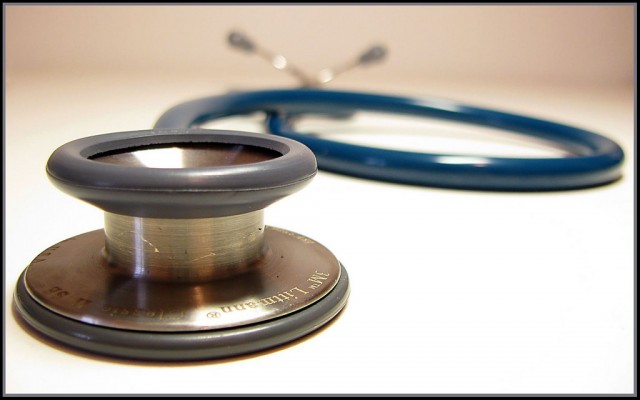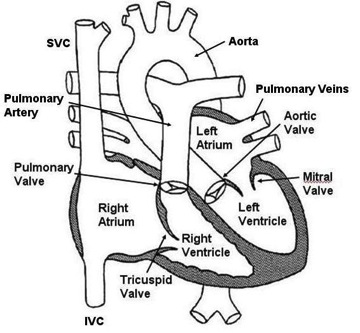
These are the four medical concerns you need to know about!
Four Medical Concerns For Babies Diagnosed With Down syndrome
Down syndrome is associated with many medical concerns. I will address what to be aware of in the first few days of life here. I know that this is scary but I reassure you that doctors are able to treat your child for each of these conditions with very good outcomes. Sometimes you will watch and wait, other times your baby may need surgery. Medicine has come a long way and there is so much that can be done for your new baby if he or she requires any intervention.
Heart
Up to 50% of children born with Down syndrome have problems with the structure of the heart. This means that there will be a hole between the chambers or abnormal connections. The most common conditions found are an atrial septal defect or ASD (hole between upper two chambers), a ventricular septal defect or VSD (hole between bottom two chambers), or an atrioventricular canal defect (all the chambers are connected). Some of the abnormalities may require immediate surgery, but the majority will require watching and waiting. Below is what a heart looks like so you can see where the different chambers are located. Holes between chambers do not mean that blood is leaking out of the heart, but that they are sharing blood.
Another very common medical condition in Down syndrome is a patent ductus arteriosus. This is not an abnormal connection or a hole. When we are growing inside the womb we do not use our lungs to oxygenate blood, this all comes from our mother. The ductus arteriosus is a normal connection that is used to get oxygenated blood to our body and bypass the lungs.
As soon as our lungs work, which is when we take our first breath, that connection is no longer needed and it is able to close due to some pretty cool things that happen in our body. All babies have to close this connection and it can occur instantly or over several days. Patent means open and so a patent ductus arteriosus is one that remains open. This will be monitored and if it does not close there is a procedure called a catheterization that can close this connection. If your child has other structural changes and needs open heart surgery it can be taken care of during that procedure as well.
Questions to ask your doctor regarding your child’s heart:
• How do you feel my baby is doing?
• Does my baby have a murmur?
• What are my baby’s oxygen saturations?
(You want 100% or as close to that as you can get. It can take several hours for a newborn to have saturations at a normal level as they transition to breathing air outside of the womb.)
• When will my child be seen by a cardiologist?
(All children with Down Syndrome need to be evaluated at some point in the first month or so)
• When will my child have an echocardiogram (ultrasound of the heart, just like how they looked at your baby when you were pregnant)?
Gastrointestinal Tract (Gut)
There are two concerns with your child gastrointestinal tract that can present themselves at birth for children with Down syndrome.
1. Duodenal atresia: The duodenum is the first part of the intestines after the stomach. Atresia means abscence or narrowing of an opening. Therefore duedenal atresia means that the duodenum is narrowed or completely closed off. This would not allow food to go through the intestines as expected. Your child will have vomiting within the first few hours of life, which will likely contain bile (green stuff).
2. Hirschprung’s disease: This prevents the child from being able to poop normally or at all due to an abscence of nerves in the rectum or colon. It sounds funny that a lack of nerves would prevent you from being able to poop, but without those nerves the rectum or colon is not able to relax to let poop out. The suspicion for this will increase if the child does not poop in the first 24-48 hours.Things to tell your doctor concerning your child’s GI tract:
• When your child pooped for the first time
• How your child is eating
Hearing
It is more common for children with Down syndrome to have difficulty hearing. Every child gets a hearing screen prior to leaving the hospital. If your child fails, they will be tested again prior to going home. If they fail a second time you will then see an audiologist for further testing as an outpatient. Do not worry if your child fails the first two tests, as that does not mean for certain that your child cannot hear. Despite passing you will continue to get hearing tests for our child though out their childhood.
Questions to ask your doctor concerning your child’s hearing:
• Did my child pass their hearing screen?
• When should we test their hearing again?
Eyes
Children with Down syndrome can also have eye concerns. The first one your doctor assesses for is cataracts. This is easily done by looking at your baby’s eyes with an ophthalmoscope. The doctor will be looking for a red reflex meaning that they are able to see the back of the eye without problems.
Other things that can be seen are abnormal eye movements. One that our own son had is called nystagmus. This is a rhythmic beating of the eye while looking one direction. When our son looked left or right his eyes would move back and forth rhythmically. If this is present at birth, it is not as concerning as nystagmus that develops several months to years later.
Children with Down syndrome have weaker muscles even in their eyes which will cause nystagmus. Their eye muscles cannot hold the eye in a certain position for a long period of time so it will beat back and forth. Despite knowing the reason why, they should still see an eye doctor (ophthalmologist, not optometrist). All children with Down syndrome should see an ophthalmologist within the first year of life.
Questions to ask your doctor concerning your child’s eyes:
• Did you see the red reflex?
• Do you see nystagmus or weird eye movements?
• When should we see the eye doctor?
While there are other medical concerns that are unique to each child, these four will be the main concern of your pediatrician during the first few weeks of your precious child’s life. The above are diagnosed based on physical exam and tests done by individuals. There are other medical diagnoses that are found based on blood tests which we address in a later post.
Congratulations on the birth of your new baby. I know this information can seem overwhelming at first, please don’t let it be. As a new parent your first priority is to spend time enjoying being a parent. Don’t let all of this new jargon steal any of the joy away from the greatness of being a parent. 🙂
[This post is a part of the “New Parent Guide To Down Syndrome” blog series. Be sure to check out the other posts!]
Yes, even a blog has to have fine print these days. Here is ours: Disclaimer: This post was written by my amazing wife, and the mother of a child diagnosed with Down Syndrome! She is also a pediatrician, but not your pediatrician! All of the information on this website (although great!) is for informational purposes only. Nothing on this site is intended to create a physician-patient relationship, replace the services of a licensed, trained physician, or to be a substitute for medical advice of a physician or trained health professional licensed in your state/Country. You should not rely on any of the information contained on this website, and should contact a physician licensed in your state/Country on all matters relating to your (or someone else’s) health. You agree that you shall not make any health or medical related decisions based in whole or in part of anything contained on this website.



Great post, I especially like the “questions to ask” section – really useful – any chance of a comparable post for toddlers (that’s when you manage to fit in an 8-day week that is!!)
Thank you so much for this information. My great grandson Hunter had some of the mentioned symprons. Thank you again . I will pass this info along to others. Very helpful!
Thanks Carole.
How is Hunter doing?
great post!!! i will most definately rember to ask next time he has a vision/hearing screening
Good info! Our daughter developed Duodenal Atresia at about 8 mos. old…she would throw-up her formula every now and then, sometimes more or less. She ended up being diagnosed at 9 mos & had surgery at 10 mos. She did great, and was in the hospital for about 5 days. Just wanted to let people know that it may not show up right away 🙂
This information is very helpful to a new parent. I love this page. You are amazing people to share your life with the world. Thanks
Great article Abbie, I had none of this info at birth. As much as I love the care we got at our local hospital, we were given NO info at all about anything! When we were sent to the Nicu in Boston we started to get info from all of the great nurses!
I don’t know if you have some info posted elsewhere, but I wanted to comment on the heart and ear conditions that are possible. First, my son had a VSD and what was going on while we kept an eye on it for a few years is that the other side of the heart had to compensate for the defect by pumping harder, which therefore caused that side to get bigger. Jim was on digitalis but was refusing to take it to the point that he would have a pretty good choking fit…and I didn’t think it was doing anything or that he was even getting the right amount.
Jim had open heart surgery a couple of months before his 4th birthday which I think was harder on him than if he had it done a year or two earlier. I think it caused a setback in some of his development. I didn’t think the cardiologist he first went to was very good at explaining everything. Another point is if the condition is left alone too long, then the main artery will harden some and shrink to balance out the blood flow and it isn’t reversible…at least that is how I understood the problem.
The ears are vulnerable to having more wax and fluid buildup behind the eardrum due to the canals being more narrow than “normal”. I do know that many people get ear tubes…typically kids. The pediatricians who saw Jim were very vague about this issue so I didn’t really get it until he saw an Ear, Nose and Throat specialist. There is product called Debrox that was recommended by Jim’s ENT (and, no, I am NOT getting a fee for the mention) to keep the wax from piling up. My Jim isn’t very cooperative about allowing us to use the drops but we do our best.
I’d tell other parents to get an otoscope and learn what is normal and to be the first line of awareness. I was told NOT to allow any doctor to flush wax out of the ear canal with water since the pressure could rupture the ear drum and that the water could be trapped causing an infection…this is after my pediatrician tried to loosen the big blob in Jim’s ear. He failed and then we had to go to the ENT and then go get a script for drops.
Jim had tubes put in early in August 2007, they fell out at some point and he had them put in again in April 2009 and so far only one has come out. The ENT did say that he should outgrow the need for them. I’d say that if there is any problem with a standard hearing test, to go directly to an ENT because he/she will give you a better idea of what is going on.
thanks for this blog my niece have problems having a bowel movement any particular milk should i be using ??? right now im using enfamil gentle ease
Great article!
Hearing was my recent concern. Turned out everything was fine and my son was just being typical kid with selective hearing. Ha ha.
But eyes are still concerning. Sometime my son’s right eye gets in quite far when he look at his left. ( I hope you understand what I’m talking about)
So I asked his dr. and she told me that’s normal.
She said
“Children with Down syndrome has extra skin on corner of their eyes that make them look like that. ”
I really didn’t like what she said and how she said it and wanted my son to see specialist, but she didn’t give us referral.
If his eyes keep doing that, I will push her to get us referral.
Your child should see an eye doctor prior to 6 months. It is in the recommendations by the American Academy for Pediatrics on health maintenance for children with Down syndrome. If you need a referral due to insurance from your pediatrician I would ask again and maybe bring up that point, or if you don’t need the referral make one yourself. They should be an ophthalmologist and not an optometrist if you are making the appointment yourself. Glad things seem to be going so well 🙂
My son is now 25 months and I want to share what we went through in the last 6 month. For the first year Andrew was between the 50-75% for weight. From a year till 18 months he just gradually was sliding down the curve until he was less than 25%. He was vomiting about 5x/week (** we would see food from the day earlier) and eventually would fight us at every meal. Until……
during an EGD that was looking for allergies our amazing GI doc found out he had an incomplete duodenal atresia. Instead of the complete atresia at birth he had a pinsize opening that could only pass liquids so when we went off of the breastmilk he wasn’t getting the nutrition we needed.
He had surgery in May and has steadily put on weight and is now meeting developmental milestones. I just wish it was discovered earlier – – it was a long year.
Even though it is rare for it to be an incomplete blockage I hope others can catch it sooner !
Thank you for sharing!! I hope someone reads this and is maybe going through the same thing. Glad you guys figured it out and he is gaining weight 🙂
great post
my child is 3 months now and he has AVSD and PDA where he will have an open heart surgery in couple of few days.
I would like to thank you for the great job you guys are doing.
may Allah (God) please all parents who have child with such problem
Hi,nice and very use full post.my son is just two and a half months.He has down syndrome.He has heart problem(Tetrology Of Fallot) and he need a open heart surgary in between his 6 months age to 1 year. We has already done a ROP test of his eyes and report came normal.Next week we have an appoinment for a BERA test or hearing test.Are we in a right track with our baby? Plz guide me..
With these medical concerns in mind, do you think it is OK for us to deliver at a birth center with a midwife? This is baby #5 for us and there is an inconclusive possibility that he will have down syndrome. Thank you!
Your postings have helped me learn more about Down Syndrome. We live in a developing country with very limited hospital support so reading your blogs really helps.
Thanks so much! Do you have a child with Down syndrome? Also what country are you in?
I have a question about your son’s nystagmus. Did his go away? At what age did you notice an improvement. Our Max is 8 months old and has had nystagmus since birth. We took him to see an ophthalmologist and she made it sound like he would always have it but when I do a search for Down Syndrome and nystagmus I come across numerous stories of babies developing out of it. We’ve noticed improvement, we think. Or we’re just getting used to it. Lol. Thanks you. Your blog is wonderful by the way. Thank you for it.